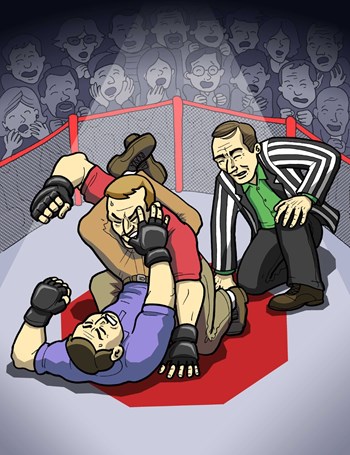
Can’t we all just get along? Neighbors helping neighbors, associations and residents working together. When someone moves into a community, they often look for the friendliness and camaraderie that living in an association brings. But with many personalities often butting heads on everyday living situations, it can often get tense and things can go awry. Neighbors argue with each other, associations complain about residents and residents complain about associations. Often, the problems aren’t extreme and can be solved amongst each other. And some can’t.
“People living with other people from different cultures and with different priorities tends to foster discontent on some level,” says Saul Cimbler of Florida Mediation & Arbitration in Miami.
Attorney Eric Glazer has seen a lot of cases in his career, but there’s one that takes the cake. He makes sure to share it when he teaches his Condo Craze Board Member Certification Course. It involved an owner of a condominium unit in a Hallandale Beach hi-rise who had a unique unit. His terrace overlooked the pool area and was only about 22 inches above the pool deck.
Taking the Plunge
This particular owner didn’t like the fact that he was so close to the pool deck but still had to leave his home, walk through the hallway, and enter into the common area lobby and out the door to the pool area each time that he wanted to use the pool. He had a better idea. “He took a chain saw and sliced off a section of the common element balcony railing, converting it into a swinging gate, and now opened the gate and jumped down the 22 inches in order to access the pool,” says Glazer, whose practice is with Glazer & Associates, P.A. in Fort Lauderdale. “When he was done using the pool, he would hop up the 22 inches to his balcony, open the swinging door and enter into his home.”
Because he altered a common element, the board filed an arbitration action against him. “Witnesses were called, a final hearing was held and the association won, but the case wasn’t over,” says Glazer.
The unit owner filed for a trial de novo in the Circuit Court of Broward County before a Circuit Court judge. Witnesses were called, a trial was held and the association won again but still the unit owner wasn’t satisfied. The unit owner appealed to the 4th District Court of Appeals. “Briefs were filed, a panel of three judges heard the case and the association won, but the case wasn’t over,” says Glazer.
The unit owner appealed to the Florida Supreme Court who ultimately declined to hear the case. “In the end, the owner was required to put the gate back to its original condition and was required to reimburse the association a lot of money in attorney’s fees and costs,” says Glazer. “I would like to think that if an experienced mediator was required to mediate the case before any arbitration or litigation took place, he would have been able to convince the owner of the dire consequences that lie ahead, and years of fighting could have been avoided.”
What are the top points of conflict between boards and residents? “The top points of conflict between boards and residents are arbitrary rule enforcement, homeowner access to records or financials, and lien foreclosure,” says Rebecca Storrow, Ph.D, the vice president of the American Arbitration Association (AAA) and former director of the AAA Florida Residential Mortgage Foreclosure Mediation Program.
According to Glazer, the most common complaint that owners make are often unsubstantiated allegations that board members are either stealing money or getting kickbacks for awarding contracts. “Needless to say, almost always unit owners never really have actual proof to support their statements, but rather only strong unfounded opinions,” says Glazer. “The other complaint that may be valid more often than not is that the board fails to keep the owners informed of what is happening in the community by making decisions about the community outside of the presence of the owners at meetings of the Board of Directors.
According to Cimbler, common problems between a board and a homeowner are when the board doesn’t follow the rules and regulations. “For example, they don’t hold their monthly meeting or a member of the board doesn’t live there anymore or qualify to be there,” he says.
Glazer explains that, under the Florida HOA and condominium law statutes, no decisions affecting the association should be made outside of a board meeting that the unit owners are entitled to attend. “The problem is often compounded by the fact that despite the fact that the statutes make it very clear that unit owners or their representatives are entitled to access virtually all of the association’s records, there are far too many arbitration actions and lawsuits filed each year wherein the board is accused of denying access to records.”
I’m Going to Sue
We live in a litigious society and, in many cases, when a problem can’t be solved the next step is to proceed to the courts where someone can to make a decision. With a serious backlog of cases on the docket, the court system has reviewed methods of decreasing the amount of cases to be seen. As a result, when a problem can’t be solved, it’s time to bring in someone to help.
According to the American Arbitration Association, statute 720.311 creates a requirement for pre-suit mediation followed by binding or non-binding arbitration under the Division of Florida Land Sales, Condominiums and Mobile Homes which is overseen by the Department of Business & Professional Regulation.
“Arbitration through the division's Arbitration Program is required for all homeowners' association recall and election disputes, prior to filing a lawsuit,” says Storrow. “Pre-suit mediation is provided by private mediators.”
“What they try to do is to provide neutral and accessible resources to people,” says Cimbler. “If you have a dispute you would file a complaint, that’s where the process starts. They handle disputes between the homeowners and the associations. The state will appoint an ADR mediator or arbitrator to decide the case.”
Mediation is a proceeding where an impartial third person supports and empowers parties in their discussion and decision-making. The parties may come to their own resolution. A Florida Supreme Court Circuit Civil Certified mediator will follow rules that include confidentiality, impartiality, and other ethical considerations.
Arbitration is the submission of a dispute to one or more impartial persons for a final and binding decision, known as an award. “Awards are made in writing and are generally final and binding on the parties in the case,” says Storrow.
“There are no other types of non-litigious conflict resolutions that work for co-op/condo buildings and HOAs,” says Storrow, but she believes it may be helpful to provide HOAs training in early and informal ADR.
If communication and civility break down between residents and the board and the situation isn’t improving, at what point should a mediator be brought in? “Informal ADR is sometimes conducted by members of some communities and can be very helpful,” says Storrow. “Mediation is best provided early so that disputes do not escalate.”
Before parties gather at mediation, there is initial fact gathering, possibly a joint or separate phone call with each party and the mediator. “Parties convene for mediation and the mediator provides an opening statement,” says Storrow. “Each party gives their perspective, there may be multiple breakout sessions (caucuses), and hopefully a resolution put into writing.”
Does it stick? “Yes, there can be binding arbitration, but a written mediation settlement agreement is a contract,” says Storrow. “An example of a successful ADR is when people who haven't paid their HOA dues have their payments stretched out over a year so that they could stay in their home.”
In this same example, Storrow says if the ADR had failed, the homeowner usually sells and moves, or enters into litigation. “When they enter into litigation, it can take a toll on their relationships in the community and can again result in selling and moving,” she says. “This is why early resolution through informal ADR within the community is helpful.”
Ask Your Manager
A property manager may be able to help settle disputes before going to litigation. “Often times the manager is the one who appears with the Board of Directors at trial and at mediation or arbitration proceedings,” says Cimbler. “Because of their experience and training, boards often yield to the opinions of their managers when deciding which way to go on a particular case. The flip side also occurs too however. Often times, when associations get sued, board members have tried to make the manager into the scapegoat and it isn’t always warranted.”
Arbitration and mediation are vastly different, but each is designed to encourage resolution of disputes outside of the courtroom setting. The petitioner files a complaint that gets assigned to an arbitrator from the Department of Business and Professional Regulation in Tallahassee. The arbitrator has the authority to decide the case. The loser has the right to file for a trial “de novo” in a court of law within 30 days after the arbitrator’s decision.
“In mediation, the mediator sits at the head of the table and asks the parties to make opening statements, usually by and through their lawyers,” says Glazer. “After these statements are made, the mediator usually separates the parties into different rooms and spends the next few hours going back and forth trying to reach a resolution of the case.”
Mediate
The mediator explains the benefits of trying to resolve the case today at mediation instead of litigating it through the courts perhaps for as long as the next few years.
“He explains that as strong as each party believes in the merits of their respective cases, the truth is that nobody knows how a judge or jury will ultimately rule,” says Glazer. “It’s better to settle on terms you can live with today rather than have a judge or jury force terms on you that you may be very unhappy with a few years from now. You put the matter behind you quickly today and save a lot of money on future attorney’s fees and costs. I always tell the parties that appear before me that I will know if I did a good job today as a mediator if both parties walk out at the end of the day feeling a little miserable.”
“Most mediators would agree that at least 70% of all cases that are mediated get resolved at mediation,” says Glazer. “I am a big believer in the process and take the position that the condominium statute should be amended to require mediation before requiring arbitration or litigation.”
What Does it Cost?
The costs of both arbitration and mediation proceedings are typically miniscule as compared with court litigation. Mediators normally charge about $250.00 per hour and the case can be resolved in one day. Litigation can last for years and the number of billable hours charged by attorneys can be enormous.
“It’s a difference between a mountain and a molehill,” says Cimbler. “The minute you start litigation in Dade County, it’s going to cost you hundreds to file a lawsuit and thousands to prepare paperwork. If you’re not prepared to spend $50,000 to $100,000 to go to litigation, you better find an alternative way. Mediation is a very inexpensive way to try and resolve things. The idea of ADR is when people start talking understand what’s important and worth fighting for and what isn’t.”
There are countless number of successful mediations and arbitrations each year involving arguments between associations and their members. Parking disputes, election disputes, satellite dish cases, landscaping cases and cases involving all kinds of topics are successfully mediated and/or arbitrated all the time.
Ultimately it’s all about talking to one another. Alternative dispute resolution offers that opportunity to talk, listen and live harmoniously in the same community.
Lisa Iannucci is a freelance writer and a frequent contributor to The South Florida Cooperator.






Comments
Leave a Comment